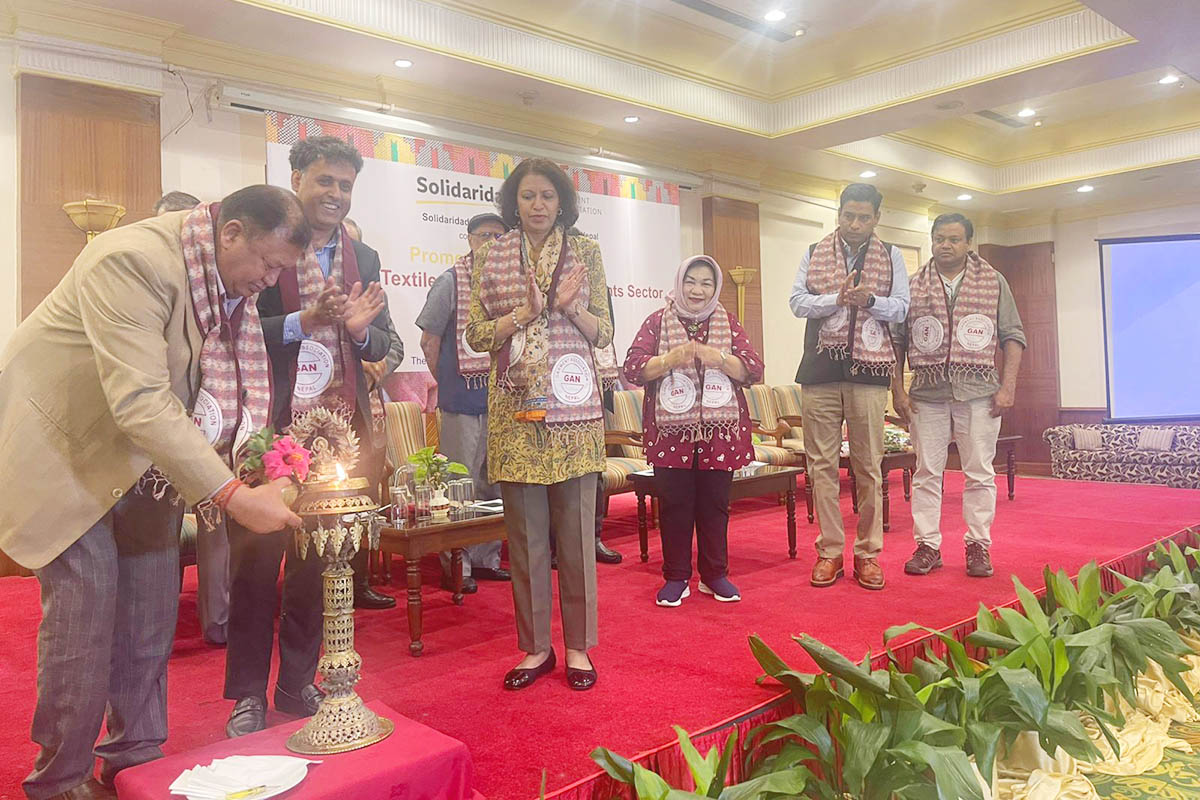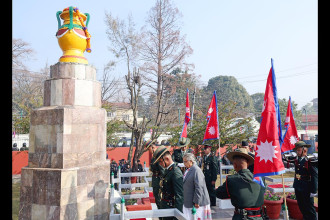
KATHMANDU: Garment Association of Nepal (GAN) and the Solidaridad Asia Network jointly held a programme titled "Promoting Sustainability in Nepal's Textile and Garment Sector" in Kathmandu on Monday.
During the programme's opening, GAN President Pashupati Dev Pandey, also the event's chair, stressed the importance of advancing sustainability measures within the Nepali textile and garment industry. These measures, undertaken in partnership with Solidaridad, will focus on decarbonisation, optimising water usage, reducing chemical use and overall empowerment. He stated that the collaboration is vital for long-term competitiveness and environmental accountability.
Shatadru Chattopadhyay, Managing Director of Solidaridad Asia, outlined the organisation's 56-year history and its presence in 56 countries, presenting a vision of development achieved through trade. He offered an example from Panipat, Haryana, India, where chemical use dropped by 22%, energy consumption and carbon emissions decreased, while waste management improved and economic benefits were realised. He expressed confidence that similar practices could be applied in Nepal.
Tatheer Zaidi, Head of Pollution Management at Solidaridad Asia, highlighted the importance of waste management in the textile and leather industries, emphasising that such practices are crucial for both environmental protection and economic gains.
Nitin Rao, Head of Planning, Innovation and Learning at Solidaridad, stressed the necessity of adopting risk assessment and precautionary measures. He presented the organisation's self-assessment toolkit and expressed an interest in collaborating with Nepali industries.
Drawing on regional experience, Selim Reza Hasan mentioned that Bangladesh's ready-made garment industry, which began with low-cost labour, has become a competitive force through in-depth sector analysis, net-zero compliance and increased worker productivity. Similarly, Anitha Munasinghe, Solidaridad Country Head for Sri Lanka, stated that the ready-made garment industry makes a significant contribution to Sri Lanka's GDP through government and private sector partnerships, with Solidaridad serving as a technical adviser and deepening collaboration with Sri Lanka's Ministry of Industry and Entrepreneurship Development.
Kiran P Saakha, former president of GAN and President of the Nepal-USA Chamber of Commerce and Industry (NUSACCI), discussed Nepal's considerable industrial growth since the 1980s, the development of supporting industries and current challenges, particularly high shipping costs. Federation of Nepalese Chambers of Commerce and Industry (FNCCI) Vice President Hem Raj Dhakal pledged FNCCI's consistent support for sustainable practices.
Members of the International Supervisory Board of Solidaridad Network also shared their perspectives. Shahamin Zaman, Board Chair, highlighted the high cost of doing business and noted that Solidaridad could assist with the export framework and impact measurement. Dr MH Mehta stated that a common roadmap is necessary for eco-friendly solutions and expressed readiness to provide all types of support, while Delima Hasri Azahari Darmawan expressed satisfaction at being part of the initiative and hoped that collaboration would resolve problems.
In his concluding remarks, chief guest Chandi Raj Dhakal, former president of both FNCCI and GAN and Vice President of SAARC CCI Nepal Chapter, stated that there should be no delay in implementing the recently signed memorandum of understanding (MoU). He stressed that all parties must work together to adopt a comprehensive approach to sustainability, creating jobs and ensuring the long-term prosperity of the industry.
At the programme's conclusion, Bhupendra Kumar Basnet, GAN's 2nd Vice-President, offered a vote of thanks, acknowledging Solidaridad Asia Network for its technical support and commitment, and thanked all speakers, guests and participants. He pledged to put the discussions into action and build a sustainable and competitive garment industry.
According to GAN President Pandey, the programme has laid a crucial foundation for guiding Nepal's textile and ready-made garment sector towards sustainability through knowledge sharing, strategic partnerships and a shared commitment to sustainable development. He believes the collaboration is expected to yield effective results in the near future.




-1769766216.jpeg)
-1769765242.jpg)
-1769754921.jpeg)